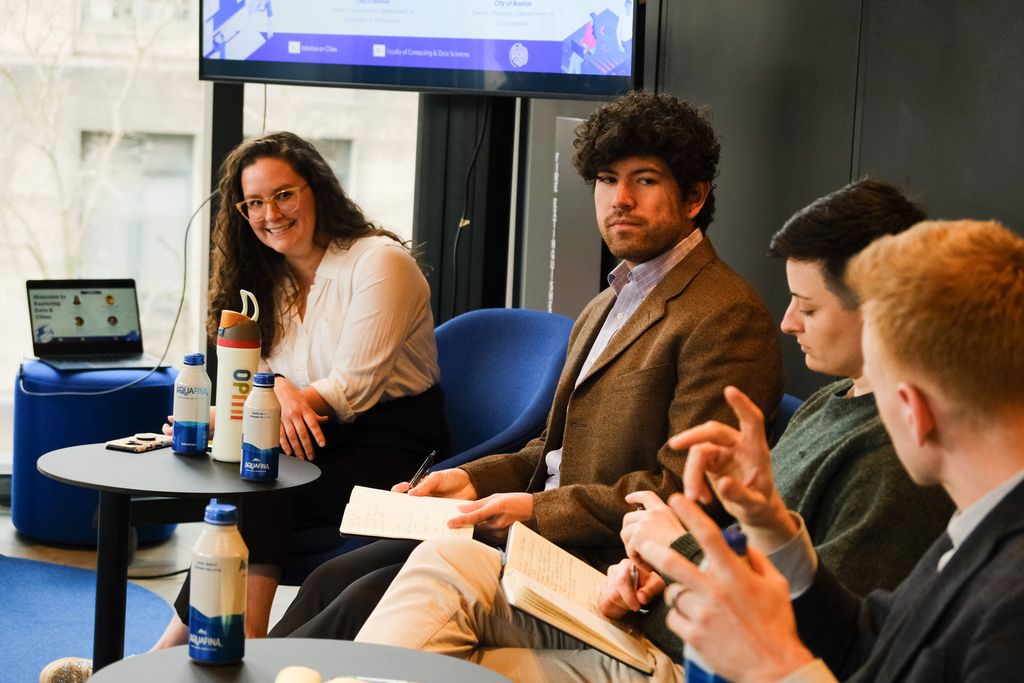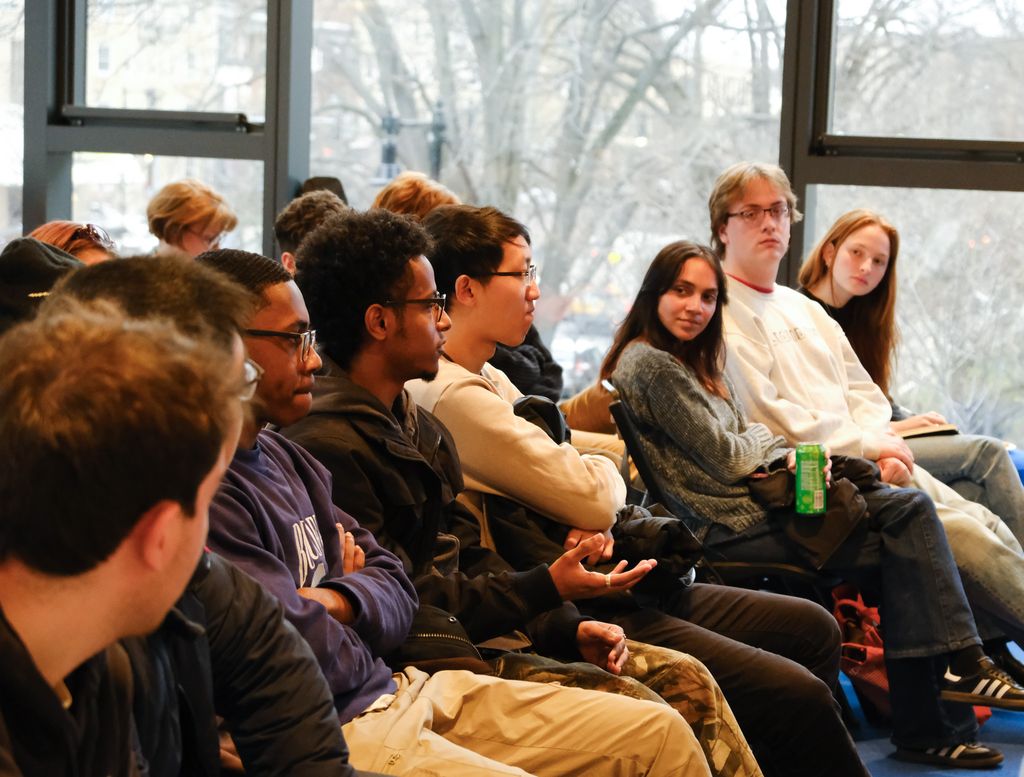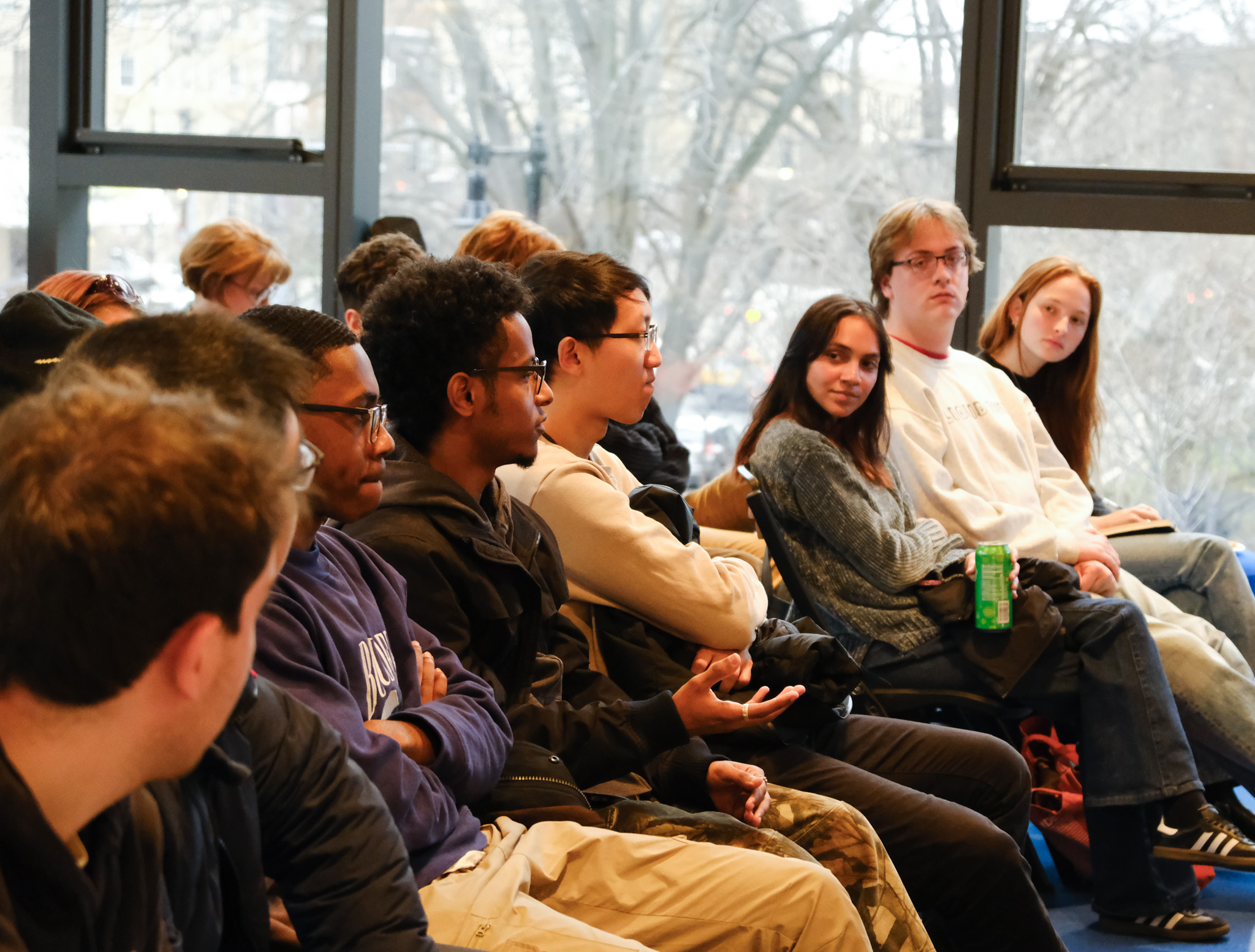Recap by Vijay Fisch
The event’s takeaways and insights were first published on the Boston University Faculty of Computing & Data Sciences website. Photos taken by Isabella Boncser.
On Friday, March 22nd, the Initiative on Cities (IOC) partnered with BU SPARK! an innovation and experiential learning lab, and the Faculty of Computing and Data Sciences to host a speaker panel titled “Exploring Data and Cities” with data experts from the city and state levels working on issues like transportation, environment, and data ethics. All three groups recognize the innovative potential of data techniques for urban research and policy.
The panel included Julia Vasta, Senior Data Analyst at the Boston Citywide Analytics Team; Dr. Jen Elise Prescott, Senior Director of the Office of Performance Management and Innovation at MBTA; Christopher Kramer, Energy Manager for the City of Boston; and Alejandro Jimenez Jaramillo, Director of Tech Governance & Policy in Boston’s Department of Innovation & Technology.
Below are some key takeaways and insights from Vijay Fisch (CDS ‘26), an Office Assistant at the Initiative on Cities, who moderated the event.
Background, Insights, & Takeaways
Greater Boston’s housing crisis is moving in the direction of Silicon Valley and the Bay Area, where sky-high living costs have forced many middle-income people into distant suburbs and pushed low-income residents onto the streets. The exorbitant housing costs in my hometown, Needham, make it difficult for people like our own teachers to reside in the area. I recognized the urgency of the situation while I was in high school and decided to become a policy advocate, leading efforts around housing reform.
After conversations with people in my town from various perspectives, I learned that turning polarizing conversations into pragmatic and actionable reforms required the strategic use of statistics and data. For example, a conversation around housing density was only possible when I discussed the revenue new customers would bring to our local businesses.
In my opinion, it’s almost impossible to change critical problems facing Boston, such as climate change, housing inequality, racial disparities in education, and inadequate public transportation infrastructure, without knowledge of data science. As a data science student, I have been inspired by the innovative potential of the data techniques I learn in class; I decided to speak with urban policy experts who utilize these tools to improve my community. This interdisciplinary panel included experts who work on various policy areas, from environment to data governance. After asking a variety of questions on the potential of data science to improve public policy, on the limitations and drawbacks of data science in government, and on career-oriented questions, I summarized the event into five key takeaways.

1. Data has an enormous potential to improve policy
It was fascinating to hear about some of the problem-solving potential that data science techniques offer to city governments. For instance, when asked to assist in setting pricing guidelines before the rollout of new electric Bluebikes, Julia employed a supply-demand analysis tool to determine the optimal strategy. Chris was working on utilizing data analysis to predict building maintenance needs before equipment failure—a strategy that could significantly reduce fossil fuel emissions. Dr. Jen Elise Prescott was employing data strategies to analyze ridership post-COVID, a challenging task given the lack of data availability. Given rampant fare evasion and the fact that riders only tap on, not off, accurately determining the foot traffic of different stations becomes particularly challenging, but data strategies can be employed to improve estimates.
The way these panelists use data in their daily work highlights the potential of a new and growing field at the nexus of public policy and data analysis. I think it is more important than ever that governments equip themselves with quantitatively skilled teams to take advantage of these innovative technologies.
2. Data has limitations and drawbacks
The panelists cautioned about the limitations of relying too heavily on data tools. For instance, in Boston, a non-emergency call line (311) is used for reporting issues such as potholes. The data generated from these calls presents an opportunity for predictive analysis, where call data from different neighborhoods could inform resource allocation. However, different communities with different socioeconomic backgrounds have different levels of faith in government institutions, which is one factor that skews data. As one panelist explained, “limitations start at data collection.” The reporting disparity between different communities leads to a biased data set, and relying on biased data can create unequal policy outcomes; someone calling about a pothole in one neighborhood doesn’t necessarily mean their community has more potholes and needs more resources.
Data science alone should not and cannot drive public policy. We can’t lose the human aspect of governance, and the solutions given to us through data analysis only show one piece of the picture. Conversations with constituents, human stories, and experiences are necessary to create good public policy, and complex solutions you can’t explain are not the right solution.
Another key conversation was about how students and universities should consider AI ethics. Aleja asked students and universities to ask themselves the following question: “How does the work I do now reflect the future I want to live in?” Data is a tool, and the panel highlighted the potential for public servants to use these technologies for the public good.
 3. Students taking data classes should not be worried about their technical abilities
3. Students taking data classes should not be worried about their technical abilities
The panelists were confident that the data science curriculum offered at BU can give students the skills they need to succeed in city government. The panelists stressed that even data-focused city planners come from various backgrounds, most of which are not explicitly data science. According to Julia, “everyone will be more than technically proficient to do this work.” Many of the problem-solving aspects of BU’s data science curriculum align closely with the methodology these experts use at the city and state levels. I encourage public policy students interested in this work to consider a data science or statistics minor or at least to take the class “Data Science for Politics” (PO 399).
One technical recommendation, though, was to learn how to use a Geographic Information System (GIS), which Julia emphasized. She explained that it is an incredibly powerful tool that students should try to learn if they are interested.
4. There are several soft skills that quantitatively focused students should develop before engaging in this work
The panelists encouraged students to develop communication, managerial skills, emotional management, and attention to detail. These soft skills are crucial for success in data science and policy work, especially when interdisciplinary collaboration and project management are essential.
5. Students have many opportunities to engage in data-focused policy research
Students should use their technical skills to play around with publicly available data sets! Even a simple Google Sheet/Excel analysis can yield fascinating results. The panelists encouraged students to analyze a variety of publicly available data from the MBTA and the City of Boston. You can find the MBTA Blue Book Open Data Portal here and Boston’s data hub here. The panelists also encouraged students to look into the MBTA/MassDOT and the City of Boston internships, including the Department of Innovation and Technology summer fellowship.
